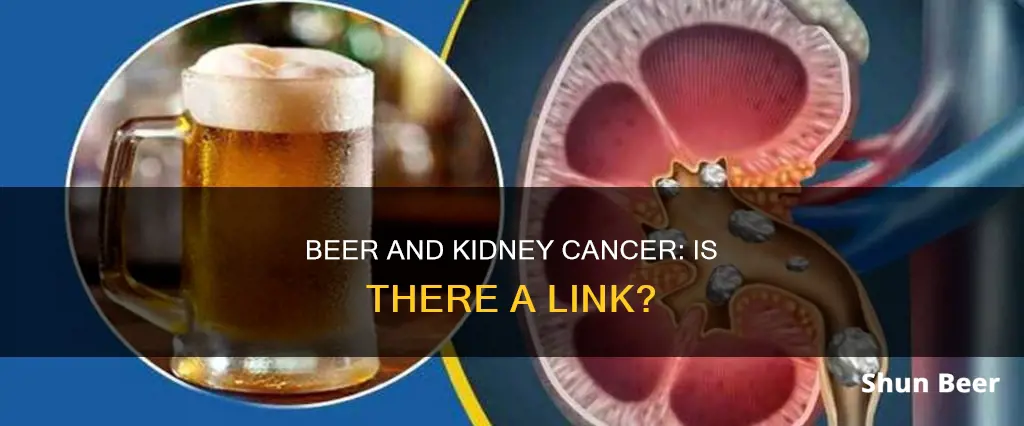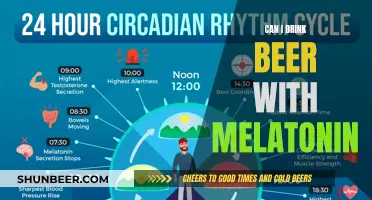
There is no consensus on whether drinking beer can cause kidney cancer. While some studies suggest that alcohol may have a preventive effect on kidney cancer, others indicate that there is no association between alcohol intake and the risk of developing this type of cancer. However, excessive alcohol consumption can negatively impact kidney health and increase the risk of other types of cancer and health issues.
| Characteristics | Values |
|---|---|
| Can drinking beer cause kidney cancer? | No, but it can cause other types of cancer and negatively impact kidney health. |
| Can drinking beer reduce the risk of kidney cancer? | Some studies suggest that drinking beer may reduce the risk of kidney cancer, but the negative effects of alcohol consumption outweigh any potential benefits. |
What You'll Learn

Alcohol consumption and kidney cancer risk
Although scientists agree that alcohol can play a role in the development of certain types of cancer, kidney cancer isn't one of them. In fact, some older research suggests that drinking alcohol may have a preventive effect on kidney cancer. However, it's important to note that the negative effects of alcohol consumption outweigh any potential benefits.
The impact of alcohol on the kidneys
The kidneys are two bean-shaped organs that filter out waste from the blood and maintain the body's fluid and electrolyte balance. While alcohol is mainly metabolized by the liver, the kidneys also work to remove harmful substances and waste from the body. When a person drinks alcohol, the kidneys must work harder to return the blood to its usual state, and this can have negative consequences over time.
The link between alcohol and kidney cancer
Some studies have found an inverse association between alcohol consumption and the risk of renal cell carcinoma, a type of kidney cancer. A 2011 meta-analysis of 15 case-control studies showed that high alcohol consumption exhibited a preventive effect for renal cell carcinoma in a dose-response manner. However, the underlying biological mechanisms for this relationship are not yet fully understood.
It's important to note that excessive alcohol consumption can have negative effects on the kidneys and other areas of the body, such as the liver. Regular heavy drinking may double a person's risk of developing chronic kidney disease, and this risk increases fivefold if the person also smokes. Additionally, binge drinking, defined as consuming four or more alcoholic drinks during a single occasion for females and five or more for males, can result in acute kidney injury.
Weighing the risks and benefits
While some research suggests a potential benefit of alcohol consumption in reducing the risk of kidney cancer, it's important to consider the broader health risks associated with alcohol use. Alcohol increases the risk of developing several other types of cancer, including head and neck cancer, liver cancer, and breast cancer. It can also lead to short-term and long-term health issues, such as injuries, violent behavior, and social issues.
In conclusion, while alcohol consumption may have a slight preventive effect on kidney cancer, the negative effects of alcohol on overall health outweigh any potential benefits. It's important for individuals to consider the risks and benefits and make informed decisions about their alcohol consumption. For those with kidney cancer or kidney disease, it's advisable to consult with a doctor about the safety and impact of drinking alcohol.
Beer and Penicillin: A Dangerous Mix?
You may want to see also

The effects of binge drinking on kidney health
Binge drinking is defined as consuming four or more alcoholic drinks in a single session for females and five or more for males. Excessive alcohol consumption can have harmful effects on the kidneys and other organs such as the liver. Binge drinking can cause acute kidney injury, a serious condition that occurs when toxins from alcohol build up in the blood, and the kidneys are unable to maintain the right fluid balance.
The kidneys are responsible for filtering out waste products and maintaining fluid and electrolyte balance in the body. When alcohol is consumed, the kidneys must work harder to filter out the harmful substances, leading to overworked kidneys that are less able to perform their regular functions. This can result in swelling of the legs, ankles, and feet due to fluid retention.
Binge drinking can also cause dehydration, which affects the kidneys' ability to function properly. Additionally, heavy drinking is associated with an increased risk of high blood pressure, which can, over time, lead to chronic kidney disease (CKD) and kidney failure. CKD has no cure and can eventually require dialysis or a kidney transplant.
The negative effects of binge drinking on kidney health are compounded by smoking. For individuals who smoke, the risk of developing CKD from heavy drinking increases fivefold. Therefore, it is essential to limit alcohol consumption to moderate levels and avoid binge drinking to maintain kidney health.
Beer Drinking Post-Whipple: What You Need to Know
You may want to see also

Alcohol's impact on kidney function
The kidneys are two bean-shaped organs that filter waste from the blood and maintain the body's fluid and electrolyte balance. While alcohol consumption has been linked to a decreased risk of kidney cancer, it can negatively impact kidney function and cause kidney damage over time.
Impact on Kidney Function
Heavy alcohol consumption can put a strain on the kidneys, as they work to remove harmful substances from the body. Regular heavy drinking may double the risk of chronic kidney disease (CKD), and this risk is further increased by smoking. Binge drinking, defined as consuming four or more drinks at once, can lead to acute kidney injury, where the kidneys are unable to maintain the right fluid balance due to a rapid buildup of toxins in the blood.
Dehydration and High Blood Pressure
Alcohol is known to dehydrate the body, which can affect kidney function. Additionally, excessive alcohol consumption is linked to high blood pressure, which, over time, can cause kidney damage and CKD.
Liver Disease
Heavy drinking can also lead to liver disease, which, in turn, puts additional strain on the kidneys.
Recovery from Alcohol-Induced Kidney Damage
Acute kidney damage caused by binge drinking can usually be reversed within a few days if alcohol consumption is stopped, allowing the kidneys to recover. However, regular heavy drinking can lead to CKD, which has no cure and may eventually require dialysis or a kidney transplant.
Alcohol's Impact on Cancer
While alcohol may have a slight preventive effect on kidney cancer, it increases the risk of developing several other types of cancer, including head and neck cancers. The negative effects of alcohol consumption are considered to outweigh any potential benefits in reducing the risk of kidney cancer.
Cold, Cough, and Beer: Is It Safe to Drink?
You may want to see also

The link between alcohol and chronic kidney disease
Although alcohol consumption is not directly linked to kidney cancer, heavy drinking can cause chronic kidney disease (CKD) and increase your risk of developing it. According to the National Kidney Foundation, regular heavy drinking may double your risk of CKD, a condition with no cure.
The kidneys filter out waste from the blood and maintain the body's fluid and electrolyte balance. When you drink alcohol, the kidneys must work harder to filter out the alcohol as a harmful substance, in addition to their regular function. Over time, this can cause kidney damage.
Initially, there may be no symptoms of kidney damage from regular alcohol consumption. However, as the kidneys become overworked, they will be less able to filter blood and maintain the correct water balance in the body, leading to symptoms such as swelling of the legs, ankles, and feet due to fluid retention.
Alcohol is known to dehydrate the body, which can affect kidney function. Heavy drinking is also associated with high blood pressure, which can, over time, cause damage to the kidneys and result in CKD. Additionally, alcohol can cause liver disease, which makes the kidneys work even harder.
If you are concerned about your alcohol consumption and its impact on your kidney health, it is recommended to speak with a doctor. Doctors can advise on ways to reduce alcohol intake and provide further support if needed. It is important to note that acute kidney damage caused by binge drinking can typically be reversed if you stop drinking and allow your kidneys to recover. However, regular heavy drinking can lead to CKD, which may progress to kidney failure.
Low-Carb Beer and Diabetes: Is It Safe?
You may want to see also

Alcohol's diuretic effect and kidney cancer
Alcohol is a diuretic, meaning it increases urine production and causes the body to lose fluids. This can have a negative effect on the kidneys, as they are responsible for regulating the body's fluid levels.
The kidneys are two bean-shaped organs that filter waste from the blood and maintain the body's fluid and electrolyte balance. While alcohol is mainly metabolised by the liver, the kidneys also work to remove harmful substances from the body.
Drinking alcohol can cause the kidneys to work harder to return the body to its usual state. Regular heavy drinking can lead to chronic kidney disease (CKD), a condition that isn't curable. Binge drinking, defined as consuming four or more drinks in one sitting, can result in acute kidney injury, where the kidneys are unable to maintain the right fluid balance.
Alcohol's diuretic effect can also lead to dehydration, which can further impact kidney function. In addition, people who drink excessively are more likely to have high blood pressure, which can also damage the kidneys over time.
While some older research suggests that alcohol may have a preventive effect on kidney cancer, the negative effects of alcohol consumption are thought to outweigh any potential benefits. Alcohol increases the risk of developing several types of cancer, including head and neck cancer, liver cancer, and breast cancer. It can also lead to a range of other short-term and long-term health issues.
Beer and Diabetes: One Drink, Many Concerns
You may want to see also







